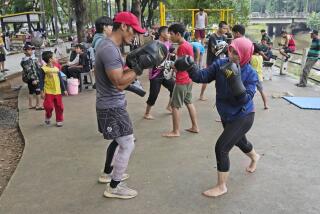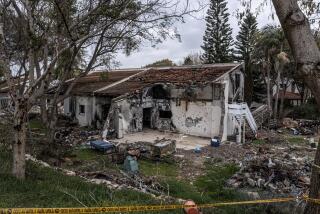Indonesian Military’s Impunity Comes Under Attack
- Share via
JAKARTA, Indonesia — After more than 50 years of unchecked power and widespread human rights abuse, the Indonesian military suddenly finds itself humiliated and on the defensive, besieged by a wrathful public demanding accountability for past misdeeds.
The reversal of fortunes, initiated by the reform-minded, democratically elected government of President Abdurrahman Wahid, has stunned the military and sent its top generals scurrying to hire a team of lawyers to answer allegations that troops under their command were responsible for murder, rape and torture. The circle of impunity that once allowed soldiers to ride roughshod over the Indonesian people is coming more and more to resemble a noose, a human rights activist said.
Each day the press runs unflattering articles about military abuses, and generals in recent weeks have been hauled into the national assembly and grilled about their conduct, an unthinkable exercise just a year ago. In East Timor and in Aceh province, in northern Sumatra, human rights teams--one of them sponsored by the United Nations--are investigating possible war crimes by the army. Human rights sources said there is sufficient evidence to bring some of the top brass to trial.
Last Wednesday, U.N. investigators said an international tribunal should be set up by the Security Council unless Indonesia quickly investigates its military’s involvement in atrocities in East Timor.
Significantly, Wahid, unlike past presidents, says he will not protect his generals, including Wiranto, the former defense chief and now a Cabinet minister. Wahid, however, objects to any trial before an international tribunal, saying Indonesia should handle such cases itself.
Wahid is well aware, Western political analysts said, that nothing could give his government more domestic credibility than to demand accountability of high-ranking soldiers involved in terrorizing a sizable percentage of the population for more than a generation.
Still, it’s a risky proposition for Wahid. The military, which continues to wield great power, regards itself as the backbone of national unity, and senior commanders are divided over whether to support reform or cling to the traditional authority the constitution gives the military. Some generals have publicly said that, if they thought the country was disintegrating--the territory of East Timor voted Aug. 30 to secede from Indonesia, and Aceh is agitating for independence--the army would step in to stop the process.
But though Wahid’s political survival may depend on military support, the army’s room to maneuver is limited. If it usurped civilian authority, the international community almost surely would cut aid, foreign investors would flee, and Indonesia’s Southeast Asian neighbors would shun the ruling generals. The economic repercussions for Indonesia would be catastrophic. And if the military opts for reforms, it loses its arbitrary authority to control the civilian population and create fiefdoms that bring promotions, power and riches. “It’s a lose-lose situation for the top brass,” a Western military attache said.
Once revered as a people’s army that won Indonesia independence from Dutch colonialists in 1949, the military increasingly has come to view large segments of society as the enemy. More than 500,000 civilians were killed when the military tracked down perceived Communists in 1965. Indonesia’s 1975 invasion and later annexation of East Timor, a former Portuguese colony, left an estimated 200,000 dead because of warfare, disease and starvation. Two thousand people are said to have been killed in Aceh since Indonesia declared the province a military zone in 1990. Twelve hundred died in May 1998 riots in Jakarta, the capital, that were triggered by the army’s fatal shooting of six students.
The Jakarta riots led to the forced resignation of President Suharto, himself a former general, and calls for the military to be reined in. Its bloc of nonelected seats in parliament was cut in half, to 38, and Wahid--who succeeded President B. J. Habibie, Suharto’s protege--sent a clear signal when he was elected in October: He made a civilian the minister of defense, bypassed the army with its sullied reputation to appoint a naval admiral as the armed forces chief and refused the military’s request to reinforce its army contingent in Aceh.
“More military is not the answer for Aceh,” he said.
“You can’t expect the soldiers to go back to the barracks overnight,” said Human Hamid, a human rights activist in Aceh. “It will take time to change their culture of violence. They’re used to thinking they’re the only segment of society that’s capable of saving the nation. But in fact, the opposite is happening. They’re destroying it.”
The immediate focus of human rights teams is East Timor, where the military was closely linked with pro-Jakarta militias that went on a rampage of killing and destruction after the territory voted for independence. Among those under investigation are four two-star generals who answered to Wiranto: Zacky Anwar Makarim, a former intelligence chief; Adam Damiri and Tono Suratman, both former provincial military commanders; and Sjafrie Sjamsoeddin, former security advisor to the defense minister.
A U.N. panel of five jurists--led by Sonia Picado of the Inter-American Institute of Human Rights--recently concluded its inquiry in East Timor and will present its findings and recommendations to U.N. Secretary-General Kofi Annan by month’s end. Similar inquiries in Africa and Europe led to the establishment of tribunals for Rwanda and Yugoslavia.
An independent Indonesian human rights team also visited East Timor in November and December. One militia leader, Joni Marques, told investigators that he killed two nuns, four male clergy and an Indonesian journalist on the orders of military commanders, a member of the team, Helmy Fauzi, told journalists. And the head of the team, Albert Hasibuan, said, “I believe Wiranto could be charged with omission or failure to take action” to stop the violence.
Wiranto had been summoned to appear last Wednesday for the Indonesian inquiry but requested more time to prepare, officials said.
In Aceh, another inquiry by a national commission is underway and a civilian-military tribunal has been established to try soldiers accused of abuses.
More to Read
Sign up for Essential California
The most important California stories and recommendations in your inbox every morning.
You may occasionally receive promotional content from the Los Angeles Times.













